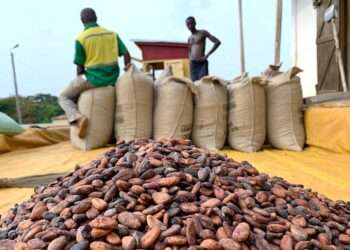The Crops Research Institute (CRI) of the Council for Scientific and Industrial Research (CSIR) has cemented a Memorandum of Understanding (MoU) with a private-sector cassava extension agency- Ghana Cassava Center agency to improve the agronomy and utilization of cassava in the country.
Dr Maxwell Darko Asante, Deputy Director of CSIR-CRI, speaking at the signing ceremony between the CRI and the Ghana Cassava Center of Excellence at Fumesua, in the Ejisu Municipality, highlighted the importance of cassava, noting that it is an important food crop that has potentials needed to be harnessed.
As such, Dr. Darko Asante noted that the private sector’s involvement is key to achieving that goal. He, thus, assured that the research institute would work to give the right human resources and technologies that would help increase cassava production and utilization in the country.
“I am hopeful this collaboration will sustain and impact positively on cassava production for Ghana as a whole. I am also appealing for stronger partnerships with the CSIR-CRI to expand and deepen research activities.”
Dr. Darko Asante
Dr Asante noted that research is a key tool for quality and improved end products, noting that the CRI would continue to investigate and bring out new crop varieties that addressed the needs of the people.
Mr. William Agyei-Manu, Executive Director of Ghana Cassava Center of Excellence (GCCE), was optimistic that formalizing relationships with the research institution would propel it to be identified as one of the institution’s private sector wings and deliver on extension drives.
The Collaboration to Promote Government Agenda
The Executive Director of Ghana Cassava Center of Excellence believes the collaboration would also help promote the government’s agenda of exporting cassava starch.
“With our role to disseminate extension information and connect research processes to services, the government’s agenda to export starch, we will do our best to promote for the private sector to invest. But we need varieties that have very high starch content that will reduce the cost of production and cost processing, this collaboration will help.”
Mr. William Agyei-Manu
Mr. Agyei-Manu mentioned that the GCCE is bringing on board Circular Economy and Environmental Policy to promote green skills in the cassava industry. He noted that they would consider how to use the cash crop as alternative livestock feed, use cassava waste to generate crude starch, and also in processing mushrooms. According to him, these circular economic processes have not been well exposed.
Cassava is the most important root crop in Ghana. According to the Ghana Export Promotion Authority, the total area under cassava cultivation is estimated at 900,000 hectares. More than 70% of farmers in Ghana produce cassava, and the sector contributes about 22% of agricultural GDP. Ghana ranks among the top five cassava producers in Africa, with an annual average production of 16 million metric tons. At least 18 varieties of improved cassava are produced in commercial quantities for various uses.
Efforts to make the cassava value chain a priority area in Ghana are part of the government’s wider policy measures to stimulate economic growth, support the private sector and create new employment opportunities, especially for youth and women.
READ ALSO: Asante Announces Significant Gold Intercepts From Its Near Mine Exploration Program























